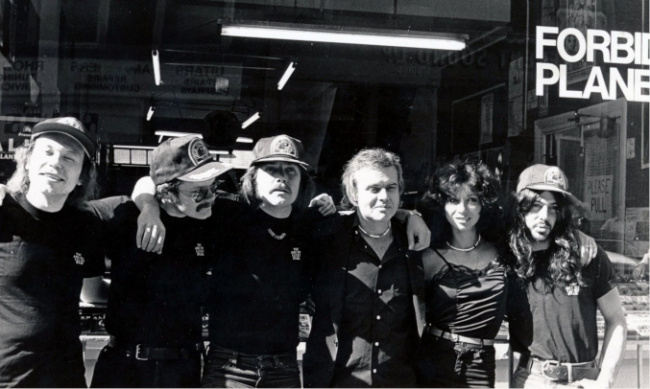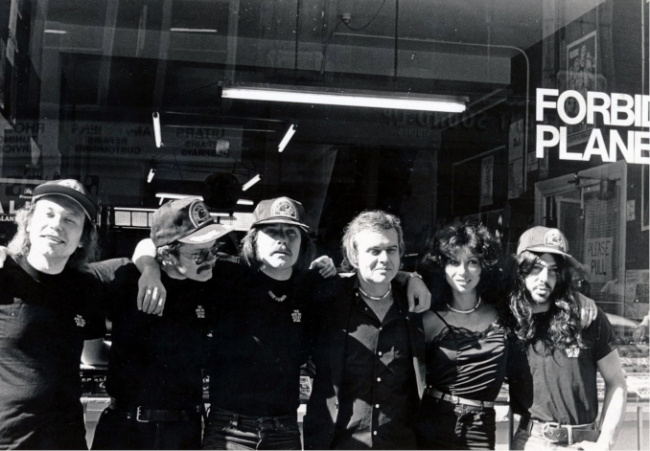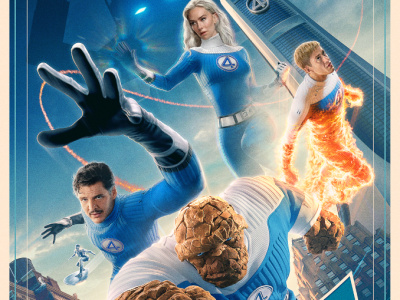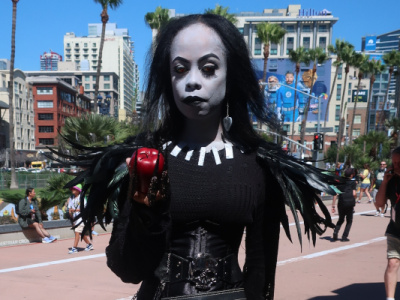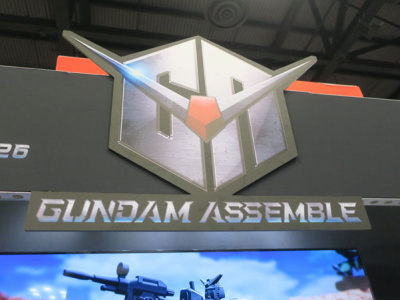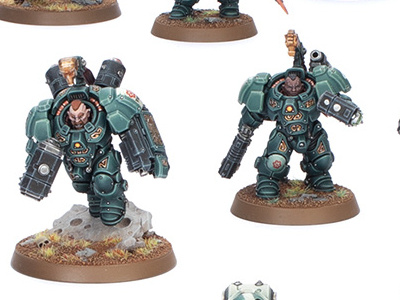For ICv2's Comics Direct Market 50th Anniversary celebration, former retailer and DC Senior Vice President—Sales and Marketing Bob Wayne (see "ICv2 Interview: Bob Wayne") talks to Landau about his years in the business. Part 2 covers his time at the publisher IPC, where he edited 2000AD, and the opening of the first Forbidden Planet store in 1978. In Part 1, Landau describes his beginnings as a retailer and the publisher of the Comics Media fanzine. And in Part 3, Landau discusses the shift to graphic novels, the sale of the distribution company to Diamond and the formation of the current company, as well as his part in the stage production of Thunderbolts: FAB.
This interview was conducted as part of ICv2's Comics Direct Market 50th Anniversary celebration; for more, see "Comics Direct Market 50th Anniversary."
To watch a video of this interview, see "ICv2 Video Interview – Nick Landau, Part 2."
Bob Wayne: Which of these things led you into joining the editorial staff at IPC Magazines?
Nick Landau: That's another story. In 1977, which was my last year at film school, I picked up the first copy of 2000AD off the newsstands with the space spinner on the front and thought, "This looks kind of good." Then the following week, the second issue came out and it featured a character called Judge Dredd, and I said, "OK, this is cool. I really need to find out what's going on at IPC," which was the publisher. Posing as a journalist for Comic Media News, Richard Burton's magazine, I went up to the offices of 2000AD and interviewed Pat Mills, who was the editor of 2000AD at the time. Three‑hour interview.
He asked a strange number of questions of me. I was supposed to be interviewing him, not him, me. At the end of the three hours, he said, "When would you like to start here? Just to confirm, I'm offering you a job." I said, "I'm still at film school. I'm not sure that I can." I went back, I checked, I managed to get the last semester off, and I basically went back to IPC and I said, "Yeah, I accept the job. I'm coming to work for IPC." So I went up to IPC.
I got diverted for a few months on another comic called Action, then joined IPC, the editorial team, in the 2000AD offices as the chief subeditor of 2000AD.
Now the editor, who was a guy by that time called Kelvin Gosnell, who had taken over from Pat Mills because Kelvin had been the guy who came up with the idea of 2000AD in the first place, and Pat was a freelance managing editor, effectively, who was looking over the launch plan for 2000. Kelvin was then, after a couple of months of being on 2000AD, asked to start a new magazine, new comic book called Starlord. After having been on 2000AD for just literally a few months, Kelvin turned around to me and said, "You're chief subeditor, but actually you're going to be the editor of 2000AD."
Suddenly, there I was in charge of a 2-300,000 copy circulation weekly comic book with about two months’ experience [laughs] and editing a lot of the strips in it.
Thankfully, my other half, who was the art editor, was Kevin O'Neill. Kevin O'Neill, the artist who later went on to do Marshal Law, got himself banned by the Comics Code Authority for having just a style that one shouldn't have apparently, according to the Comics Code. Besides being an art editor, he was an editorial genius as well. He would come up with all these great ideas. Between the two of us we, just basically both having a huge interest in U.S. comics, slightly changed the nature of 2000AD.
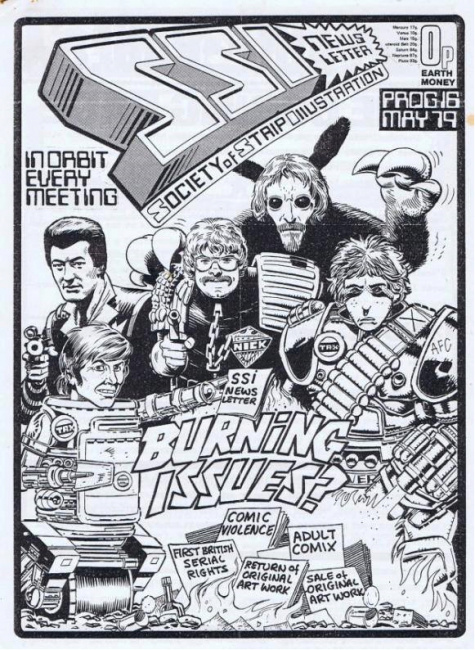
1979 'Society of Strip Illustration Newsletter' edited by Kevin O'Neill and Landau. Cover features (clockwise) each artist drawing themselves as a character from '2000AD'. Clockwise: Kevin O'Neill, Dave Gibbons, Nick (drawn by Brian Bolland), Bolland, and Mick McMahon. Joint copyright to each artist.
It was like letting the genie out of the bottle where we suddenly got to a stage where we realized that we'd actually changed the industry by giving credit to writers and artists. Both IPC and DC Thomson, who was the main competitor, were very protective of their writers and artists. They'd never let anybody know who the writers and artists were. Of course, if you really understood comics, you'd recognize styles and you'd know where to go, but they had this somewhat false assumption that by not putting the credits on, you'd never find the artist or writer, thereby, you could never steal each other's creators.
Anyway. We blew that for them by putting the credits on. It then, over the years, started to spread through the rest of IPC and the rest of the industry.
Then the other thing we got involved with—although it had just started to happen a little earlier on—was the return of original artwork as well. We really were looking to the U.S. to see how we should be working properly with writers and artists.
Now, at the same time, was Comic Media Distribution Service still ongoing? Was Comic Media Distribution Service selling 2000AD to comic shops, so that you were effectively producing the magazine on one side with the other colleagues and selling them on another side?
Yes, that was the night job. The night job was distribution. My first associate in Comic Media Distribution Service was, of course, Richard Burton, who had become my co‑editor on Comic Media and had later taken over Comic Media News. That carried on for a few years.
By that stage my parents had kicked me out of the house, or at least, not kicked me out but had actually kicked the business out of the house. I had to go and get a warehouse. I think Richard decided it was time for him to retire, so I got another associate called Mal Burns, who came along and ran the warehouse while I was…, I guess would have been at film school, and then moving on to the beginnings of 2000AD.
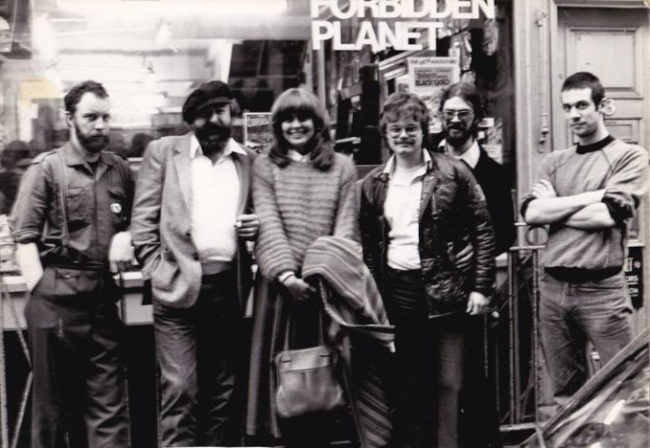
Bill Burke (FP1 Manager), Mike Moorcock and Linda Moorcock, Nick, Gamma (Books buyer), Dick Jude (Asst Manager)
The importation of comics, the American comics, was actually well progressed by that stage. One of the innovations that I had way back in the day was to bring comics in by air freight. In fact, Richard, all the way back, used to pick up the comics in the boot of his car, and then we'd sort them out at my house. Then they'd be distributed out to the few comic book stores that there were at the time. That carried on, except it got larger and larger.
When Mike initially joined me, he had a few customers as well. He had previously worked at Dark They Were and Golden Eyed, so we joined forces. Then when Mike Luckman joined, that enabled us to grow the distribution business. So all the time that I was working on 2000, I was also working on building the Comic Media Distribution Service. Then there was a point at which we decided that Comic Media Distribution Service wasn't a good name. We'd outgrown the name and changed the name to Titan Distributors.
I'd always been a big fan of mythology. The Titans were the parents of the gods. Also, it had this, obviously, the comic book connotation, Teen Titans, etc., and astronomical connotation, being a moon of Saturn as well. I just sort of felt the title was a good name. Also, it was really good because we could walk in, see our bank manager, there might only be three of us, but because we had a name like Titan, we sounded like a much bigger company than we were.
Around the same time when you reorganized as Titan, I assume there was a catalyst where you felt, "Well, we might as well get in retail as well because I don't have enough to do in my life."
Bob, you're doing a fantastic job following my chronology because I find it really tough to follow all these different strands of what I was simultaneously doing. I think you're doing an amazing job here. Yes. Sorry. I've gone and completely distracted myself, so could you repeat that?
Basically, we're really close to the point or at the point where you decide that you're going to open a retail store.
Open a store.
You search for a location. You decide Denmark Street right off of Charing Cross would be a wonderful place to have a nice, small location to sell to folks.
Here's the backstory on that. We were distributing to comic book stores around, and yet there was still one store that was much bigger than all the others called Dark They Were and Golden Eyed. I'd been selling to them for a long time. Let's just say that there were some issues internally, I thought they were, that had nothing to do with us. We were a little bit concerned about what would be likely to happen there. We thought that the only way that we could protect our distribution business was to actually open a store ourselves.
I think it was Luckman who found the location on Denmark Street. Now, Denmark Street [is] otherwise known as Tin Pan Alley, which is Britain's Tin Pan Alley. It's the music street in London. It's where all the bands come to buy their musical instruments.
It actually turned out to be an amazing location because we were suddenly right in the center of music culture. Remember, we opened our doors in 1978. Immediately, we had bands coming in. Denmark Street was where the Rolling Stones were formed at the Gioconda Cafe, just across the road from us. David Bowie used to come down to get his instruments. All the big bands at the time were coming in. We were able to get the word out about Forbidden Planet through the bands as well. We would talk to them. I remember one day having a really nice breakfast with Zodiac Mindwarp. On one side, I had Slam Thunderhide, and on the other side, I had Kid Chaos, and then Zodiac was sitting in front of me. It was one of those, "Oh, could you pass the salt, please, Kid Chaos?" It was a very weird experience, but we would constantly be talking to the bands. We'd be talking about comic books. We realized that they were very, very into comics.
There's quite a synergy between music and comics because a lot of musicians, certainly with names like Kid Chaos, assume an identity. In effect, they become a superhero on stage. I expect Kid Chaos was a really cool John Smith, but he became Kid Chaos when he went on stage to sing. So they had this instant synergy with comic books.
I remember talking with Darryl McDaniels, Run‑DMC, and he was explaining exactly the same thing, because he's very into comics. We've had some great signings with him in London. In fact, he helped us celebrate our 42nd anniversary, sang a nice song about Forbidden Planet. He was saying that they were very influenced by comics. That they would go on stage and they would become Superman, or they would become Batman, or they would become a super character that they had invented themselves and adopt that persona.
When we opened in Denmark Street, of course we didn't realize that at the time, but it was a very synergistic business to the comic book business. When we started producing merchandise, we would get The Human League going out on Top of the Pops wearing our merchandise. Nick Rhodes of Duran Duran was a big customer of ours, insisted that his book, which of course, we weren't going to say anything against because it was a great idea, he insisted that we had his book signed at Forbidden Planet. Nothing to do with comics, nothing to do with anything. He just figured that Forbidden Planet was the cool store that he would go to.
I remember we had a queue of about 3,000 young girls waiting outside for Nick's signing. I think we sold a total of about five books that day, but had we had camera cubes, we would have sold about 3,000 of those because all they wanted to do was come in and get a picture with him. I remember after the event, figuring how on earth were we going to get out of the store because we were surrounded by 3,000 girls. What we ended up doing was, it felt like that scene from A Hard Day's Night, where I think it was Mike, myself, and Nick running down the street, pursued by about three or four hundred of the girls. Getting to the end of the road, and he jumps into a cab. We think we're going to get crushed by all these girls smashing up against us on the cab, but they'd melted away. We turned around. They'd gone. Obviously, all they were after was to get a slice of Nick. Nick Rhodes, not Nick Landau, unfortunately. [laughs]
My memory of visiting that location, my main memory was I had never been in any place that had that much merchandise packed into such a small space. One of the clerks mentioned something about a signing, and my mind is just racing trying to figure out where would you put people for a signing? Where would the queue be? Because it just seemed like you'd have to have them outside to come in one at a time almost for that.
At some point, you obviously decided that the store was doing well enough that you relocated to a larger location. Is that around the same time that you expanded with additional stores? Then at some point, explain how you ended up with a store in New York City because that's really not on the British rail line. [laughs]
No, that was a bit of a challenge, particularly when the till went down. What happened was that we went through a fast expansion. '78 was when we opened. Because we were music central, we managed to grow very quickly.
Two things happened. One, we knew we needed more space. Our first step was actually not to go and get a bigger store, but to keep the original store and open a second store around the corner, which we called Forbidden Planet 2, which was a film and TV store. The first store was comics and science fiction, and the second store was film and TV, and those became our trademark areas, as Forbidden Planet grew, were the three areas that we really moved into. This was pre‑merchandise. There wasn't a lot of tie‑in merchandise at the time.
The other thing that happened was that in about a year after we opened the store in I guess, '79, Mike Luckman moved to New York. He had got into discussions with Phil Seuling and Jonni Levas and he'd basically said, "We have Forbidden Planet in London." We started talking with Phil and Jonni about the idea of opening a store in New York in partnership with them. So Sea Gate, or really, on a personal level, Phil and Jonni, were 50% of Forbidden Planet, New York. We had the expertise of running stores and they had the supply of comics. It seemed like a natural partnership to work with them.
For the next few years, Luckman, being based in New York, ran the New York store. Phil and Jonni were really silent partners in the operation. In the UK, that left Mike Lake and myself running the UK operation, which was the retail side and the distribution side. Mike had more of a hand in distribution. I had a hand in the retail, so we both had our own areas of management.
Then we expanded. FP was getting a lot of attention around the country. People started wanting to become part of the brand. We ended up having approaches from people saying, "Could I rebrand my store Forbidden Planet?" Of course, that then led us to looking at how we could expand the Forbidden Planet group. We basically started opening stores around the country, all working with existing retailers who wanted to become a Forbidden Planet. That gave us super growth around the UK.
Click here for Part 3.



